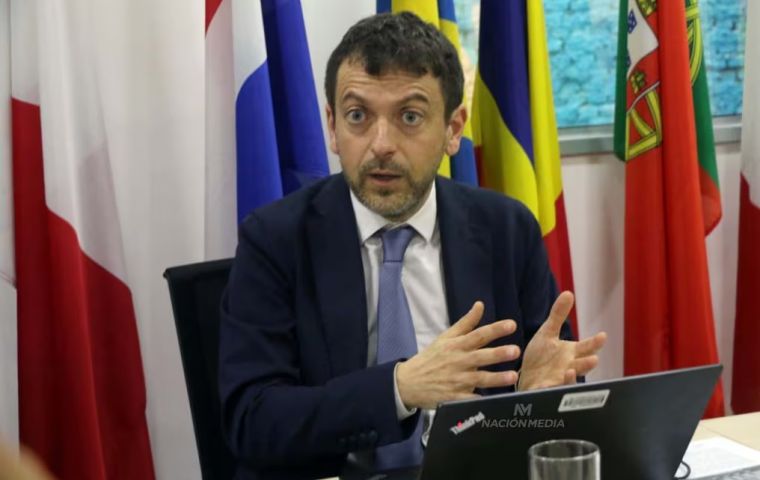MercoPress. South Atlantic News Agency
No backtracking on Rule 1115, EU envoy tells Paraguayan producers
 Pitto also said his trip was to “see the efforts” Paraguay was making to guarantee that its products” do not come from deforested land
Pitto also said his trip was to “see the efforts” Paraguay was making to guarantee that its products” do not come from deforested land European Union (EU) Environment Commission envoy Emanuele Pitto told Paraguayan exporters Thursday in Asunción that there would be no turning back from Rule 1115 banning raw materials and products associated with deforestation and forest degradation. The measure not allowing imports nor exports of these goods has been in force since June 29 last year.
The standard applies to livestock, cocoa, coffee, rubber, oil palm, soybeans, timber, and some byproducts such as beef, leather, printed paper, palm oil, soybean meal, chocolate, furniture, tires, and vulcanized rubber clothing. Hence, traders must submit proof that the production of these items met these requirements.
Pitto told reporters in Asunción Thursday that his presence in Paraguay as well as that of EU Cooperation representative Matteo Sirtori was “to clarify the requirements of the Deforestation free law, what it asks for and what it does not, and specifically that value can be given to the traceability and transparency of products without destroying forests. The initiative was already underway in other instances by the environmental movement, and the regulation only came to accelerate it.”
He also highlighted the efforts undertaken by Paraguay such as the mapping of forest cover presented last Wednesday by the National Forestry Institute (Infona), the advances in traceability of the Rural Association of Paraguay (ARP), the articulation between several ministries, and the approach of local private producers.
Pitto also those involved to get acquainted with the regulation and to understand that the requirements are adapted to the needs of consumers which was submitted to public consultation. He also explained that those wanting to export goods to EU countries need to demonstrate the origin of their products and that they are free of deforested land, for which the country needs a traceability tool or system that can geolocate whether or not the product comes from deforested land.
This fact then needs to be verified by the importers on the European side. In case of non-compliance, sanctions and confiscations would ensue.
Pitto also admitted that crop rotation still amounted to deforestation as per Food and Agriculture Organization of the United Nations (FAO) standards. He suggested producers separate their crops between those adjusted to Rule 1115 and those that would not meet its requirements.
“If Paraguay wants to continue exporting to the countries of the bloc, if it is interested, it will do so by adapting to the requirements, but not of the European Union, but of the consumers,” he underlined.
“We are here to listen, to clarify doubts about the regulation, to update,” Pitto told EFE. He also said that the purpose of his trip was to “see the efforts Paraguay is making to adapt to more traceability and more transparency so that products” do not come from deforested land while neighboring countries were already working on traceability tools.
The envoy also underscored that Rule 1115 also applies to European exports, so “there is no type of discrimination.” The regulation is going through a transitional period and will be fully in force by the end of this year.




Top Comments
Disclaimer & comment rulesCommenting for this story is now closed.
If you have a Facebook account, become a fan and comment on our Facebook Page!